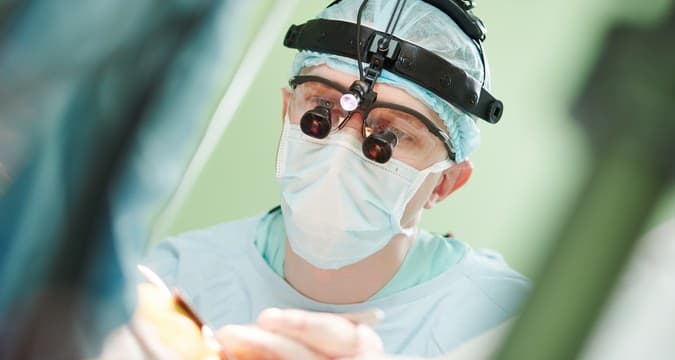The neurosurgeon specializes in the diagnosis and surgical treatment of injuries and pathological conditions of the central and peripheral nervous system. This includes treating disorders such as craniocerebral injuries of varying severity, intervertebral hernia, CNS diseases, including tumors, and congenital anomalies and defects. At GMS our neurosurgeons have many years of practical experience and are among the best in their field. For best results, certain surgical procedures for treatment of diseases of the central nervous system are performed at partner clinics.
Contact a neurosurgeon if you develop any of the following:

Nausea, vomiting, fainting, disorientation, tinnitus or dizziness following a head injury are all an indication that you should immediately see a neurosurgeon.
Neurosurgeons specialize in the surgical treatment of a wide range of pathologies and traumatic injuries of the brain, spinal column and spinal cord, and other parts of the nervous system:
In any medical situation, the sooner the patient receives adequate medical care, the greater the likelihood of a successful outcome. This is especially true with neurological pathologies. If you or a loved one has any of the above symptoms, contact GMS Hospital online or by phone for a consultation with a neurosurgeon.
At the initial consultation, the doctor asks the patient about their symptoms as well as about any previous injuries or diseases. Then the neurosurgeon performs physical examination of the patient, and, in order to obtain a complete clinical picture, orders a number of laboratory analyses and instrumental exams which may include:

In life-threatening situations, emergency neurosurgery may be have to be performed without the possibility of conducting the above tests.
Neurosurgeons perform the following types of surgical interventions:
All neurosurgical operations are carried out using state-of-the-art equipment, including high-precision surgical optics and advanced microsurgical and endoscopic technologies.
After the neurosurgeon studies the results of the lab tests and examinations, he or she determines whether a surgical procedure is required. If it is not, the patient will be referred to another medical specialist, usually a neuropathologist. If surgery is required, the patient is checked into the hospital for preoperative preparation.
For elective (planned) surgery, the patient checks into the hospital either on the day before or the day of the operation. In emergency situations, the patient is immediately hospitalized, and after minimal preparation the operation is performed. In the postoperative period, the patient follows a rehabilitation program designed by the neurosurgeon which may include bed rest, massage, drug therapy, exercise therapy, and a special dietary regime. If you need medical advice from an experienced neurosurgeon, sign up for an appointment at GMS Hospital now, online or by phone.
Our specialists will contact you